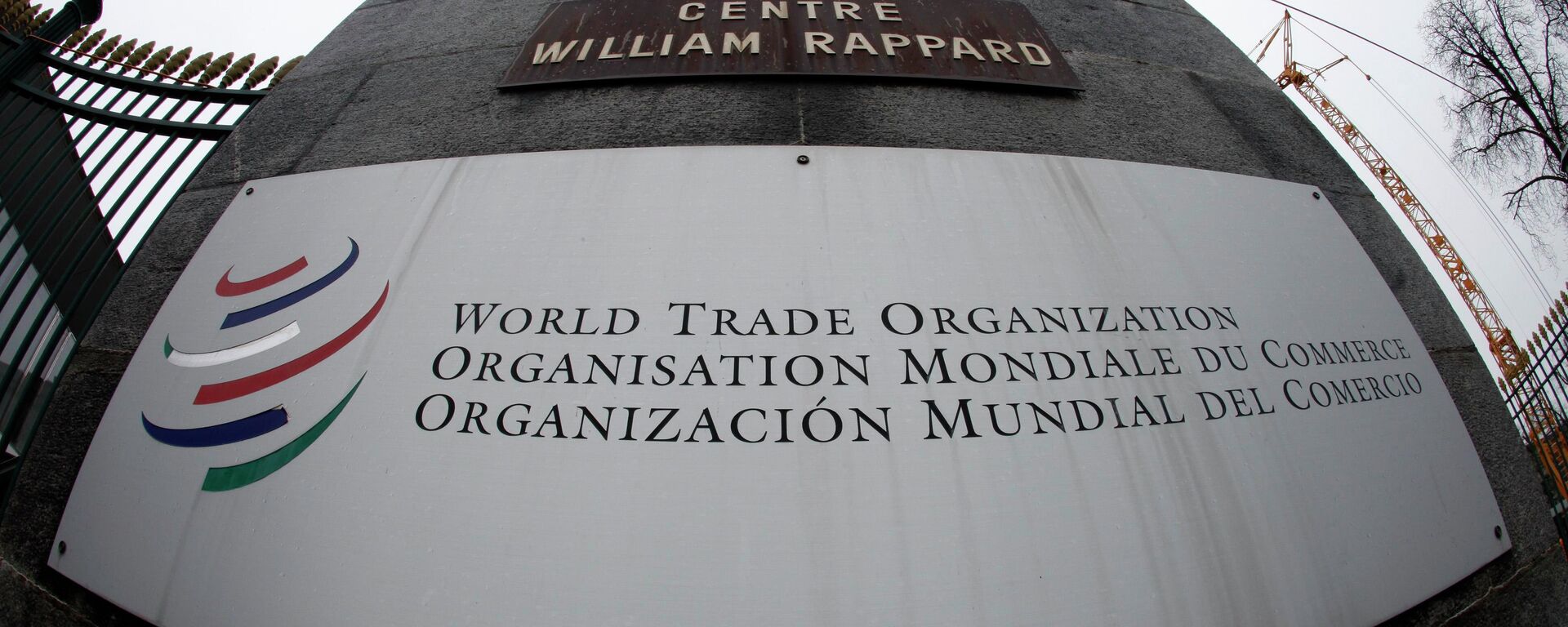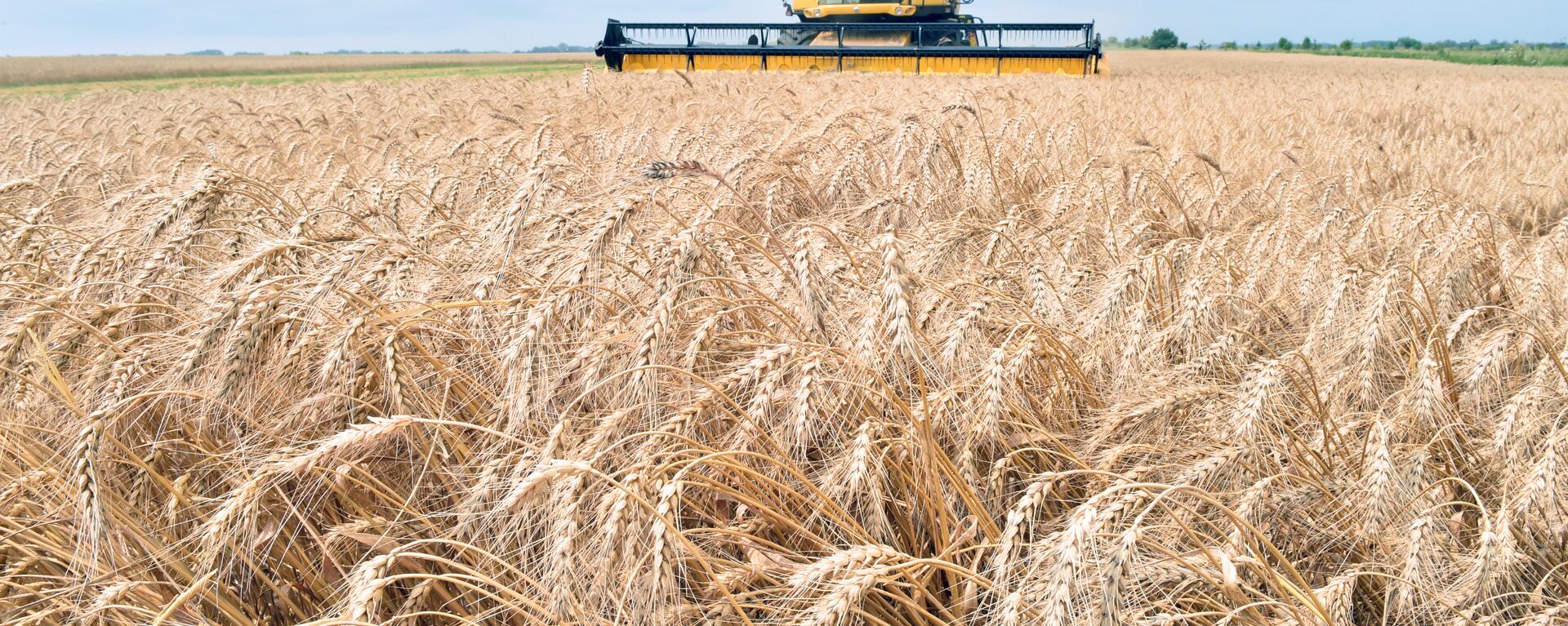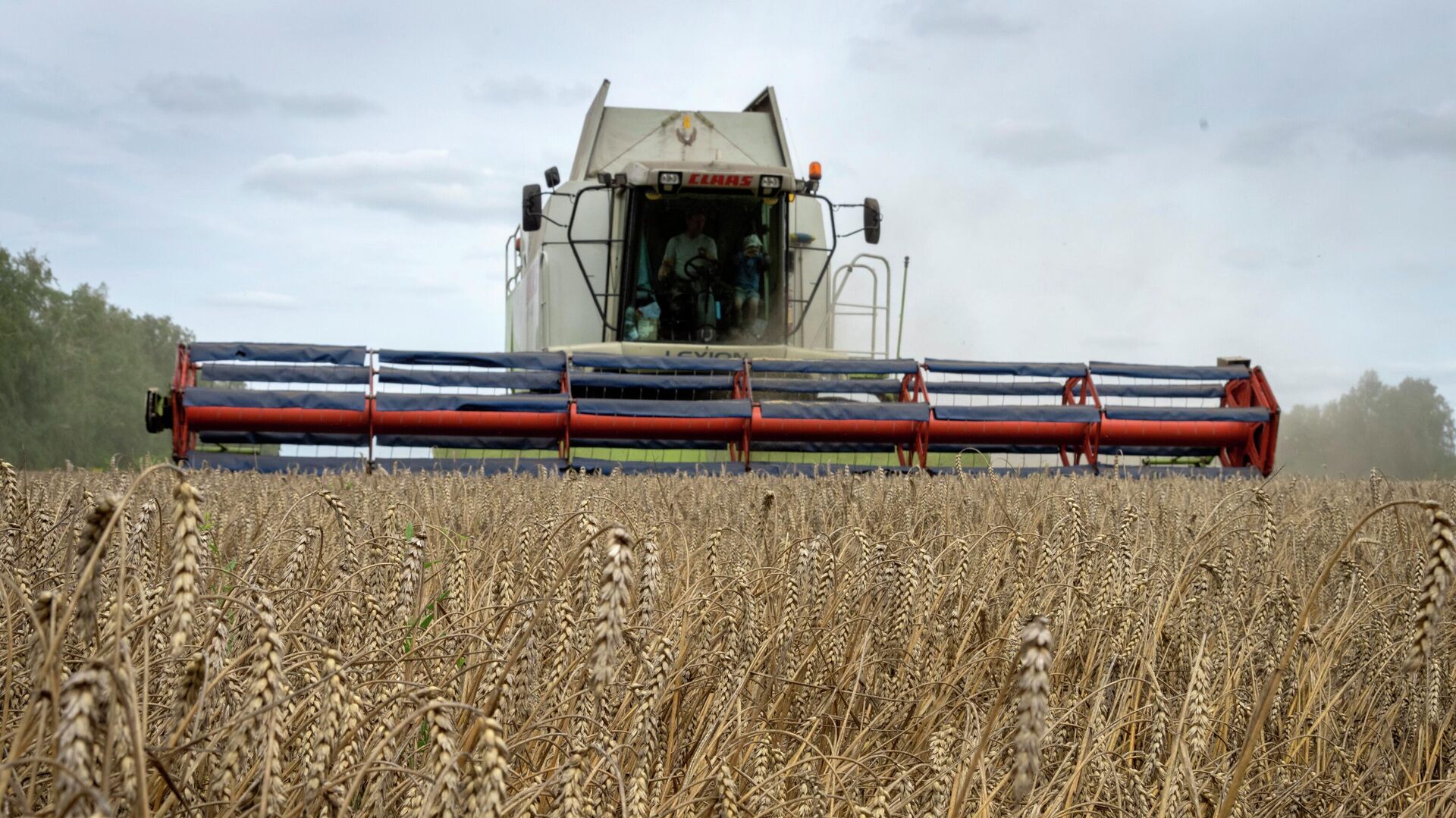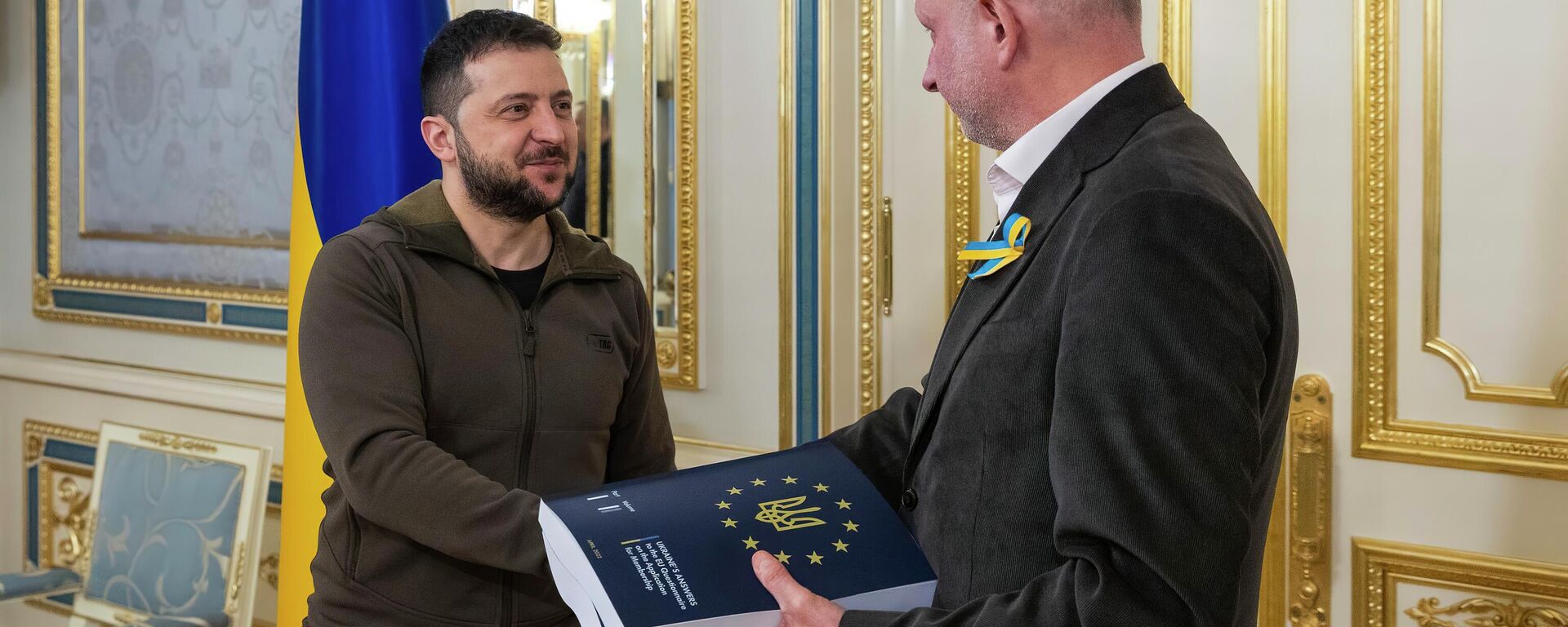https://sputnikglobe.com/20230918/ukraine-grain-row-shows-war-fatigue-seeping-in-as-eu-has-own-interests-at-stake-1113457047.html
Ukraine Grain Row Shows 'War Fatigue' Seeping in as EU Has 'Own Interests at Stake'
Ukraine Grain Row Shows 'War Fatigue' Seeping in as EU Has 'Own Interests at Stake'
Sputnik International
Ukraine grain row shows that war fatigue is seeping into EU, Gabor Stier, foreign policy senior analyst at Hungarian conservative daily Magyar Nemzet told Sputnik.
2023-09-18T16:22+0000
2023-09-18T16:22+0000
2023-09-18T16:22+0000
analysis
ukraine
grain
world trade organization (wto)
hungary
poland
black sea grain deal
https://cdn1.img.sputnikglobe.com/img/07e6/09/0e/1100758304_0:0:3094:1740_1920x0_80_0_0_cd66d0cb8c9a9bbe9f9aab9085d5d147.jpg
Ukraine thinks that “the world revolves around it” and that it can “do anything, ask for anything,” and it’s demands will be met at once, Gabor Stier, senior foreign policy analyst at the conservative Hungarian daily Magyar Nemzet and member of the Valdai Discussion Club told Sputnik.It is very problematic that as of late, Kiev has been adopting such an “unacceptable” stance even with its biggest ally, Poland, the expert said, adding:Furthermore, what Kiev is doing is “diplomatically counterproductive,” Gabor Stier pointed out.Earlier, Ukrainian Deputy Economy Minister Taras Kachka said Kiev would file a complaint with the World Trade Organization (WTO) over the ban of Ukrainian grain imports by Poland, Hungary, and Slovakia. "It is important to prove that these actions are legally wrong. And that's why we will start legal proceedings tomorrow [on Monday]," Kachka told a newspaper on Sunday. The official called the bans "ridiculous," adding that they would probably affect a significant part of Ukraine's exports, forcing Kiev to introduce retaliatory sanctions and prohibit the import of fruits and vegetables from Poland.Later on Monday, the WTO told Sputnik that it had not received any request from Ukraine to initiate dispute proceedings over the ban on the country's grain imports.Most of the aforementioned states have previously eagerly signaled their support for the Kiev regime. Poland has been especially "sympathetic," sending weapons and providing training to Ukrainian troops. On this occasion, Warsaw urged the European Union to prolong its embargo on Ukrainian food imports, including corn, wheat, sunflower and rapeseed, on September 12, but the plea went unheeded.The new row brewing within the EU over Ukrainian grain has laid bare the “hypocrisy” of EU countries when their own interests are at stake. The scandal also indicates how swiftly the tide might turn against the Kiev regime when the question of its future fate comes up on the agenda.“We live in Europe, we have our own interests, especially in neighboring countries, in Central Europe, where dumping of Ukrainian grain on the markets destroys [these countries’] agriculture... And I think it’s normal if these countries oppose Ukrainian imports or exports. I think everyone should look out for their own interests. That is what Poland, Hungary, and Slovakia are doing,” Gabor Stier said.Regarding Poland, one needs to remember that the country is facing looming parliamentary elections in a month, the pundit added.As for the European Union, Gabor Stier emphasized that its actions regarding Ukrainian grain were puzzling.Gabor Stier also recalled how when the Grain Deal was being pushed through a year ago, there was a clamor in the West that "the world was starving, Africa was starving." Then send it to Africa, the pundit stressed, adding that if Western Europe wants to buy grain to feed its livestock, "because that's what they buy it for," then let it.“Ukraine’s interests are not the only ones out there,” the expert reiterated, adding:Weighing in on how the current row over Ukraine’s grain might affect its EU membership aspirations, Gabor Stier said:Ukraine itself, with its actions, is "helping everyone understand" the problems that Kiev becoming a member of the European Union would be fraught with, Stier concluded.
https://sputnikglobe.com/20230918/ukraine-threatens-to-complain-to-wto-after-three-eu-states-ban-its-grain-import-1113450242.html
https://sputnikglobe.com/20230913/ukraine-grain-conflict-divides-eu-again-1113351729.html
https://sputnikglobe.com/20220719/eu-ambassador-tells-ukraine-not-to-expect-membership-shortcuts-1097590441.html
ukraine
hungary
poland
Sputnik International
feedback@sputniknews.com
+74956456601
MIA „Rossiya Segodnya“
2023
News
en_EN
Sputnik International
feedback@sputniknews.com
+74956456601
MIA „Rossiya Segodnya“
Sputnik International
feedback@sputniknews.com
+74956456601
MIA „Rossiya Segodnya“
ukraine grain, complaint with the world trade organization, wto, ban of ukrainian grain imports by poland, hungary and slovakia,
ukraine grain, complaint with the world trade organization, wto, ban of ukrainian grain imports by poland, hungary and slovakia,
Ukraine Grain Row Shows 'War Fatigue' Seeping in as EU Has 'Own Interests at Stake'
Earlier, the Ukrainian authorities revealed they were planning to begin the process of filing a complaint with the World Trade Organization (WTO) over a ban on imports of Ukrainian grain by Poland, Hungary, and Slovakia.
Ukraine thinks that “the world revolves around it” and that it can “do anything, ask for anything,” and it’s demands will be met at once, Gabor Stier, senior foreign policy analyst at the conservative Hungarian daily Magyar Nemzet and member of the Valdai Discussion Club told Sputnik.
It is very problematic that as of late, Kiev has been adopting such an “unacceptable” stance even with its biggest ally, Poland, the expert said, adding:
“This is wrong. Kiev does not understand that in European societies and, by the way, even in Polish society, war fatigue is already acutely felt. And I would like to emphasize once again that other countries have their own interests to pursue. And if someone does not want to understand this, then they get what they get in return.”
Furthermore, what Kiev is doing is “diplomatically counterproductive,” Gabor Stier pointed out.
Earlier, Ukrainian Deputy Economy Minister Taras Kachka said Kiev
would file a complaint with the World Trade Organization (WTO) over the ban of
Ukrainian grain imports by Poland, Hungary, and Slovakia. "
It is important to prove that these actions are legally wrong. And that's why we will start legal proceedings tomorrow [on Monday]," Kachka told a newspaper on Sunday. The official called the bans "
ridiculous," adding that they would probably affect a significant part of Ukraine's exports, forcing Kiev to introduce
retaliatory sanctions and prohibit the import of
fruits and
vegetables from Poland.
Later on Monday, the WTO told Sputnik that it had not received any request from Ukraine to initiate dispute proceedings over the ban on the country's grain imports.
A few days ago, Poland, Slovakia, and Hungary imposed a ban on imports of Ukrainian grain, despite the European Commission's refusal to extend the embargo beyond September 15. The EU's executive arm announced that it would lift the ban on duty-free Ukrainian grain imports to five neighboring EU countries and oblige Kiev to introduce export control measures.
Most of the aforementioned states have previously eagerly signaled their
support for the Kiev regime. Poland has been especially "sympathetic," sending weapons and providing training to Ukrainian troops. On this occasion, Warsaw urged the European Union to prolong its embargo on Ukrainian food imports, including corn, wheat, sunflower and rapeseed, on September 12, but the plea went unheeded.
The new row brewing within the EU over Ukrainian grain has laid bare the “hypocrisy” of EU countries when their own interests are at stake. The scandal also indicates how swiftly the tide might turn against the Kiev regime when the question of its future fate comes up on the agenda.

18 September 2023, 10:24 GMT
“We live in Europe, we have our own interests, especially in neighboring countries, in Central Europe, where dumping of Ukrainian grain on the markets destroys [these countries’] agriculture... And I think it’s normal if these countries oppose Ukrainian imports or exports. I think everyone should look out for their own interests. That is what Poland, Hungary, and Slovakia are doing,” Gabor Stier said.
Regarding Poland, one needs to remember that the country is facing looming parliamentary elections in a month, the pundit added.
As for the European Union, Gabor Stier emphasized that its actions regarding Ukrainian grain were puzzling.
“If the European Union, as many people in Brussels think, is, so to say, ‘one state,’ then what they did was a betrayal. If not… if this is a union of different states, then all I can say is that Brussels does not understand, or does not want to understand the interests of its own members.”

13 September 2023, 17:15 GMT
Moscow suspended its participation in the Black Sea grain deal, also known as the Black Sea Grain Initiative, on July 18. The Kremlin had repeatedly emphasized that the Turkiye and UN-mediated deal’s component on facilitating Russian grain and fertilizer exports was not being fulfilled, specifically with regard to reconnecting Russian banks to SWIFT and unblocking the Tolyatti-Odessa ammonia pipeline. Moscow also pointed out that just three percent of the grain shipped out of Ukraine went to countries in need in Africa and Asia, with the vast majority instead ending up in Europe and Turkiye.
Gabor Stier also recalled how when the Grain Deal was being pushed through a year ago, there was a clamor in the West that "the world was starving, Africa was starving." Then send it to Africa, the pundit stressed, adding that if Western Europe wants to buy grain to feed its livestock, "because that's what they buy it for," then let it.
“Ukraine’s interests are not the only ones out there,” the expert reiterated, adding:
"The example with grain exports, and the battles and disputes… show what will happen if Ukraine becomes a member of the European Union… Then this mentality and this behavior will destroy the European Union. And if the European Union does not understand this, then there will be big and serious problems.”
Zelensky signed the application for Ukraine's accession to the EU on February 28, 2022, a few days after the start of the Russian special operation. During the EU delegation's visit to Kiev on April 8, 2022, Zelensky received a questionnaire to begin Ukraine's accession process. On June 23, 2022, the EU approved granting Ukraine the status of a candidate for joining the bloc - the first step in a long process of accession.
Weighing in on how the current row over Ukraine’s grain might affect its EU membership aspirations, Gabor Stier said:
“I hope that some kind of sobering effect is happening, and more and more countries, and people are beginning to see... the true face of Ukrainian nationalism for what it is.”
Ukraine itself, with its actions, is "helping everyone understand" the problems that Kiev becoming a member of the European Union would be fraught with, Stier concluded.





